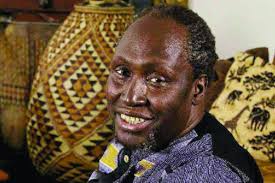
Acclaimed Kenyan Writer and Dissident Ngũgĩ wa Thiong’o Dies at 87

 :
| Updated On: 29-May-2025 @ 12:30 pm
:
| Updated On: 29-May-2025 @ 12:30 pmSHARE
Ngũgĩ wa Thiong’o, the renowned Kenyan writer, academic, and political dissident, has died at the age of 87, his family announced. His daughter, Wanjiku wa Ngugi, shared the news on Facebook, expressing sorrow and describing his life as “full” and his journey as a meaningful struggle. At the time of his death, Ngũgĩ was undergoing kidney dialysis, though the immediate cause of death remains unknown.
Born in 1938 in colonial Kenya, Ngũgĩ emerged as one of Africa’s most significant postcolonial literary figures. His early life was deeply shaped by the Mau Mau uprising in the 1950s, a violent rebellion against British colonial rule that left a lasting impression on his worldview and creative work. Ngũgĩ’s writings often explored the complex legacy of colonialism and the disillusionment that followed Kenya’s independence in 1963. His themes revolved around the intersections of language, culture, history, and identity—topics that would define much of his literary and political activism.
Initially writing in English, Ngũgĩ gained early acclaim for his novels and plays critiquing colonial and post-independence Kenyan society. However, in the 1970s, he made a radical and controversial shift to writing in his native Kikuyu and Swahili languages. This decision, intended as an act of resistance against linguistic imperialism, was both bold and divisive. Fellow Kenyan writer David Maillu recalled that many thought Ngũgĩ was both “mad and brave” for abandoning English, the language of international recognition, and questioned who would read his books in local languages.
One of Ngũgĩ’s most influential works is Decolonising the Mind (1986), written while in exile. In this book, he argued that true cultural and psychological liberation for African people could not happen while they continued to use the language of their oppressors. It became a foundational text in postcolonial literary studies and a powerful manifesto for linguistic and cultural decolonization.
Ngũgĩ was not only a literary figure but also a political activist. In 1977, he was imprisoned in Kenya for staging a play, Ngaahika Ndeenda (I Will Marry When I Want), which criticized socio-political injustices in contemporary Kenyan society. His arrest marked him as a prisoner of conscience and a symbol of resistance. Following government crackdowns on artistic expression, Ngũgĩ went into self-imposed exile in 1982, first to the UK and then to the United States.
In the U.S., he became a professor of comparative literature at the University of California, Irvine, while continuing to write essays, novels, and memoirs that explored the Kenyan experience and broader themes of oppression, resistance, and liberation. His academic work and literary contributions earned him global recognition as a major voice in African and world literature.
Following his death, tributes from around the world poured in. Kenyan opposition leader Martha Karua called him a “literary giant and patriot” with an “indelible footprint.” Amnesty International’s Kenya branch thanked him for his “freedom writing,” while sociologist Margaretta wa Gacheru described him as a “Kenyan Tolstoy” for his narrative power, love of language, and panoramic portrayal of social and class dynamics.
Ngũgĩ wa Thiong’o leaves behind a profound legacy as a fearless writer, cultural warrior, and champion of linguistic and political freedom.
Contact Us
House. No. : 163, Second Floor Haridev Rd, near Puberun Path, Hatigaon,Guwahati, Assam 781038.
E-mail : assaminkcontact@gmail.com
Contact : +91 8811887662
Enquiry
×
Reporter Login
×